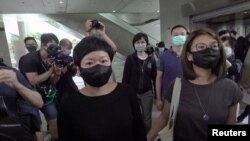Writers sharing their experiences of the coronavirus pandemic or expressing views on their cultural heritage are at increased risk in China, which accounts for nearly one-third of all the 273 writers, academics and intellectuals in jail in 2020.
The number imprisoned increased from 2019, largely because of the pandemic, according to a new index compiled by rights group PEN America. Its Freedom to Write Index, which tracks jailed writers and public intellectuals worldwide, showed China, Saudi Arabia, and Turkey accounting for half of all cases.
“Political leaders around the world—in autocracies and fragile democracies alike—have used the pandemic and protest movements as an excuse to further constrain rights rather than expand them,” the report said, adding that some countries have wielded laws about disinformation as a means of silencing the truth.
Karin Deutsch Karlekar, director of PEN America’s Free Expression At Risk Programs, said during a virtual report release last month that the situation is poor in China.
“China has jailed 81 writers. This is far more than any other country, primarily due to the arrests of writers and commentators who critiqued their government's response to COVID and other policies, as well as new information coming to light about detentions in the Xinjiang region,” she said. COVID is the disease caused by the coronavirus.
The report cited the case of Li Wenliang, a doctor who was the first in China to sound the alarm over the coronavirus. He was detained by the police for spreading rumors about public health, and later died after succumbing to the virus.
Several citizen journalists, including Zhang Zhan and Chen Qiushi, were also detained by Chinese authorities for reporting and documenting the pandemic. A poet, Zhang Wenfang, was sentenced to six months’ imprisonment for an online poem that included vignettes of people’s experiences of the pandemic, PEN found.
In addition, Xu Zhangrun, a professor at Tsinghua University Law School, was placed under house arrest for criticizing the government's response to the pandemic. He was later detained for seven days on charges that he had solicited a sex worker in 2018, and subsequently expelled by the school.
Sarah Cook, research director for China, Hong Kong and Taiwan at the U.S. government-funded non-profit Freedom House, told VOA that aside from the risk of detention, writers can find themselves under economic pressure if authorities shut down their web pages or accounts.
“Some writers who were previously able to write and share their writing through unofficial channels like WeChat or Weibo, their accounts get shut down, and that means they have to get another job,” Cook told VOA Mandarin. WeChat and Weibo are major messaging apps and social media platforms in China. Weibo is akin to Twitter.
She said that this pushes people to jump the firewall and publish in more independent or critical outlets outside China. “The fact that they wrote for some of these outlets or published by some of these outlets can be perceived as subversive and get them into trouble,” Cook said.
China has rejected criticism of its rights record by rights groups and accused the United States of being hypocritical, pointing to the arrests during protests in the U.S. last year.
Minorities targeted
Among the 81 writers and public intellectuals jailed in China, nearly half are from the Xinjiang and Tibetan Autonomous Regions, Inner Mongolia and Hong Kong.
Freedom House’s Cook said the conditions for these people are much more dangerous, and the likelihood of serving time in prison is very high.
“I think the situation, especially in Xinjiang, is that so many of these people, when they wrote the content it was OK. And then there's been this retroactive punishment with things that were previously on the safe side of the red line suddenly aren't,” Cook said. “That's one reason you've seen so many Uyghur intellectuals including professors, writers and songwriters being swept up in these latest detention sweeps in 2017.”
“It matters a lot who you are and particularly what religious or ethnic community you are from,” she said.
In 2017, Qurban Mamut, a well-known Uyghur writer and editor-in-chief of Xinjiang Culture magazine, went missing after visiting his son in the United States. Later, his family learned that he was arrested and detained in Xinjiang’s so-called re-education or mass detention camps.
Bahram Sintash, Mamut’s son, said that Beijing is trying to prevent journalists and writers like his father from recording the Uyghur culture.
“Right now the atmosphere of the Uyghur society (is that they are) without their own intellectuals, without their own books, without anything to let the Uyghurs learn about their own culture and language,” he said at the press briefing. “Previous generations like my father and other intellectuals, they no longer can write about Uyghurs, and they are mostly in camps and jail.”
China has denied all accusations of wrongdoing in Xinjiang and said that the mass incarceration camps are “a place for de-radicalization” and “not a prison.”
PEN America’s Karlekar said attempts to remove cultural heritage by jailing writers is a worrying trend globally.
“We see that writers who speak out and preserve linguistic rights, speak out about different cultures are under attack or threat. Their very writing and work is also a way of cultural preservation,” she said. “In countries that are really trying to crack down on ethnic or religious minority groups, these people are really being targeted.”
The PEN report found that overall, the Asia-Pacific region jailed the most writers and intellectuals. In total, 121 - nearly half of the global count including China - were detained in Cambodia, India, Myanmar, Sri Lanka, Thailand, and Vietnam.







